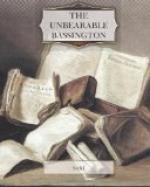“And to think she should be captured by Courtenay Youghal,” said Francesca, bitterly; “I’ve always deplored your intimacy with that young man.”
“It’s hardly my intimacy with him that’s made Elaine accept him,” said Comus.
Francesca realised the futility of further upbraiding. Through the tears of vexation that stood in her eyes, she looked across at the handsome boy who sat opposite her, mocking at his own misfortune, perversely indifferent to his folly, seemingly almost indifferent to its consequences.
“Comus,” she said quietly and wearily, “you are an exact reversal of the legend of Pandora’s Box. You have all the charm and advantages that a boy could want to help him on in the world, and behind it all there is the fatal damning gift of utter hopelessness.”
“I think,” said Comus, “that is the best description that anyone has ever given of me.”
For the moment there was a flush of sympathy and something like outspoken affection between mother and son. They seemed very much alone in the world just now, and in the general overturn of hopes and plans, there flickered a chance that each might stretch out a hand to the other, and summon back to their lives an old dead love that was the best and strongest feeling either of them had known. But the sting of disappointment was too keen, and the flood of resentment mounted too high on either side to allow the chance more than a moment in which to flicker away into nothingness. The old fatal topic of estrangement came to the fore, the question of immediate ways and means, and mother and son faced themselves again as antagonists on a well-disputed field.
“What is done is done,” said Francesca, with a movement of tragic impatience that belied the philosophy of her words; “there is nothing to be gained by crying over spilt milk. There is the present and the future to be thought about, though. One can’t go on indefinitely as a tenant-for-life in a fools’ paradise.” Then she pulled herself together and proceeded to deliver an ultimatum which the force of circumstances no longer permitted her to hold in reserve.
“It’s not much use talking to you about money, as I know from long experience, but I can only tell you this, that in the middle of the Season I’m already obliged to be thinking of leaving Town. And you, I’m afraid, will have to be thinking of leaving England at equally short notice. Henry told me the other day that he can get you something out in West Africa. You’ve had your chance of doing something better for yourself from the financial point of view, and you’ve thrown it away for the sake of borrowing a little ready money for your luxuries, so now you must take what you can get. The pay won’t be very good at first, but living is not dear out there.”
“West Africa,” said Comus, reflectively; “it’s a sort of modern substitute for the old-fashioned oubliette, a convenient depository for tiresome people. Dear Uncle Henry may talk lugubriously about the burden of Empire, but he evidently recognises its uses as a refuse consumer.”




